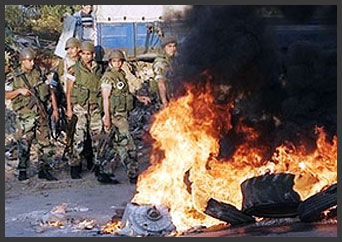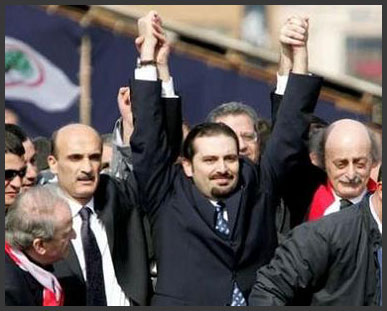Lebanon Political Situation
This is the second cabinet that consists of 30 ministers that do represent all the religious communities in Lebanon.·
To what extent is the situation in the region improving and do you see any signs of progress?
I wish there was progress.· Most of us deplore the fact that the peace process in this region has been very slow and at times blocked.· This seems to be the situation at the present time.· We need to make sure that all parties involved honor their commitments.· This is something that Israel has not done.· The fact that they continue to expand their settlements in Jerusalem and the West Bank hinders any movement towards comprehensive peace.· The other thing that exacerbates tensions in the region has to do with Iran and the political confrontations there.
What could be the potential causes of conflict in the future?
 As a Lebanese, we are most worried about seeing Lebanon become a battleground once again for regional wars.· Lebanon is part and parcel of the Arab world and we’re committed to the Arab peace initiative; we hope that a reasonable historical compromise will be reached.· Short of getting there, our country is probably one of the most vulnerable with respect to the eventuality of an explosion in the region.· We are a small country that is plural, that enjoys a great deal of freedom and we’re an open society.· These might be virtues but they are costly virtues.
As a Lebanese, we are most worried about seeing Lebanon become a battleground once again for regional wars.· Lebanon is part and parcel of the Arab world and we’re committed to the Arab peace initiative; we hope that a reasonable historical compromise will be reached.· Short of getting there, our country is probably one of the most vulnerable with respect to the eventuality of an explosion in the region.· We are a small country that is plural, that enjoys a great deal of freedom and we’re an open society.· These might be virtues but they are costly virtues.
What is the current political climate in Lebanon ; the internal factors ?
This is the second cabinet that consists of 30 ministers that do represent all the religious communities in Lebanon.· But the novelty is that we have had two consecutive national unity governments; governments that have the widest possible political representation.· We are government that seeks consensus which brings stability.· Following the May 2008 events where there was violence in the streets of Beirut, we needed to seek stability.· So it is both by necessity and eventually for the good of the country that we have national unity governments.· Decisions are not easy to make; we discuss endlessly before we’re able to make a decision.· The problem is that the minority exercises a de facto veto power, meaning there is some sort of dysfunctioning of the democratic system.· That is the other side of the stability that is brought by the national unity
 government.
government. Lebanon today is moving forward.· The government talks about simple priorities such as providing broadband access, and improving internet services.· Can you talk about the obstacles faced?
Political progress is slow.· I still think that we will be able to move forward; I’m hopeful but I’m frustrated for there is a tendency here to politicize excessively issues that by their shared nature are not necessarily political.· There is enough dynamism in the country mostly from the private sector and civil society ; I think they challenge us as government to honor our commitments and they remind us of the promises we have made.
Can you explain the tentative line between regulation and freedom of speech or press in Lebanon?
In Lebanon, the media is free and they have always been free. Our laws are very liberal and our reality is much more liberal than our laws.· We have more media organizations per capita than anywhere else in the world.· Had it not been for a longstanding history of media freedom that these organizations would not have come to us from all over the place.· The problem I think Lebanon sometimes suffers from with respect to media is that some of these media organizations are not independent.· I think independence is essential for the media to do its job properly.· You are free in Lebanon to say anything about any matter, but many people in the profession are not independent enough vis a vis the political and economic groupings that have control of their media organizations.· I think this is where improvement needs to be made.· Whether this can be solved by regulation or by agreeing on national ethics, this is a matter for debate.· Maybe we need new laws that will regulate the media ; maybe we need of a national code of ethics for the journalists.· Some of our laws need to be made a bit more modern.
What is the agenda of the ministry for 2010?· What would be your ideal situation?
“Personally I’m committed to enhancing public media;
that is media outlets that are nonpartisan, that are
independent, that are not politically nor commercially
driven.· They can cover territory that is not covered by
private media.“
What is your perception of Western-Muslim relations?
It is difficult to generalize but I think they have deteriorated.· Mutual perceptions are not as hopeful as one who could have liked.· There’s little dialog happening.· We are prisoners of fear, suspicion, sensationalism, and culturalism.· I’m not sure we are as different as we claim, or that cultural differences generate problems which are generally politically or economically motivated.· I think Lebanon could be a place of dialogue for religions and cultures, and a model of ability to draw strength and enrichment from diversity.· We should be able to prove that diversity might be an added value to democracy, freedom and peace among nations.
What is your final message to our international audience about Lebanon and perhaps about Lebanese life?
My hope is that Lebanon will not be seen only through the eyes of those who fear that it is a mirror of regional conflicts.· It is truly a country that has been able to bounce back, to heal itself from the ravaging effects of the successive wars we have had.· It is a country where there is a very vibrant society; this is true of our economy and cultural life.· No matter how the state institutions might be hampered in performing their duties, the society is more dynamic and moves forward, and this needs to be seen and recognized in the world.· The more we’re able to project this image the more we are able to heal our country from the wounds of conflicts, both internal and regional.